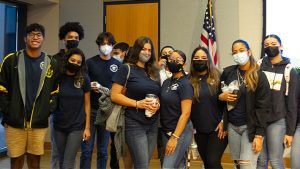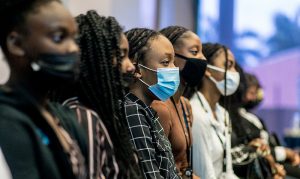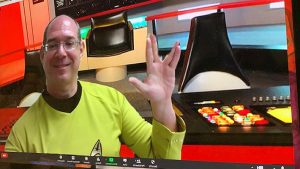In an increasingly complex business world, students know that building relationships is key to identifying and obtaining internships and jobs, as well as an important way to explore career options. Yet for many, networking – the most effective way to begin those relationships – remains a challenge.
To help them build their skills, FIU College of Business students and their mentors shared a networking exercise designed to prepare for their college-to-career transition.
“Networking is more than just friending,” John Nykolaiszyn, director of the College of Business’ Career Management Services, told students. “Today, face-to-face contact is more important than the social media connection because it enhances relationship-building and showcases confidence and professionalism.”
During the interactive session, Nykolaiszyn offered students tips for becoming better networkers, including how to start a conversation and the importance of being confident, interesting and professional.
Mentors at the January 25, 2017 event echoed his suggestions, adding their personal stories and sharing recommendations to make networking easier: Know what you want to say and how you’ll say it. Keep it short. Don’t talk about your hobbies. Make sure to follow up on the conversation via email.
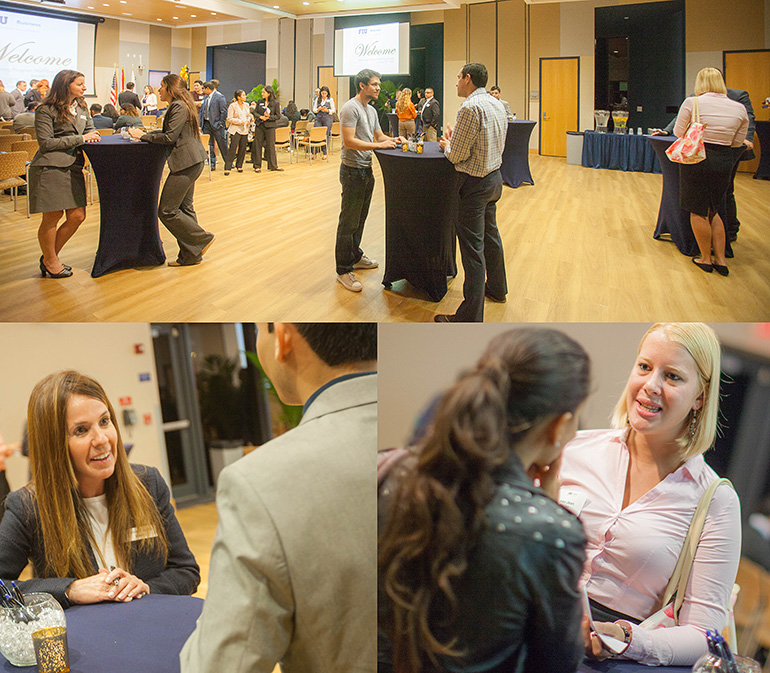
“Students should not directly start selling themselves,” said Amy Mehndiratta (IMBA ’16), a former mentee who is now a mentor. “Mentors should give them positive guidance on how to make the other person comfortable when talking to them.”
Mehndiratta, operations analyst at Miami Cordage, a rope and wiring manufacturer, recalled how her mentor, Eugene Lukac, a specialist leader in business-IT strategy at Deloitte Consulting, helped address her concerns.
“Coming from India, I was a little nervous while talking to people, addressing them by name and opening up to them so easily,” said Mehndiratta. “Eugene helped me overcome my fears and made me confident.”
Today, Mehndiratta works closely with her mentee, Daniel Denis-Diaz, to help him develop personal contacts, polish his skills for seeking a job and interviewing for a job, and take the steps necessary to realize his goals.
“Amy has helped me realize that what executive really want and need are people who will go to great lengths to improve the companies they work for,” said Denis-Diaz, a junior majoring in management. “Sometimes it’s not about what you can do to improve yourself, but what you can do to improve or innovate at work.”
This was the first networking session with corporate executives for Denis-Diaz. His quest was for advice on how to pursue internships and experience to work in project management, a field he likes because it allows requires strategic thinking and attention to detail.
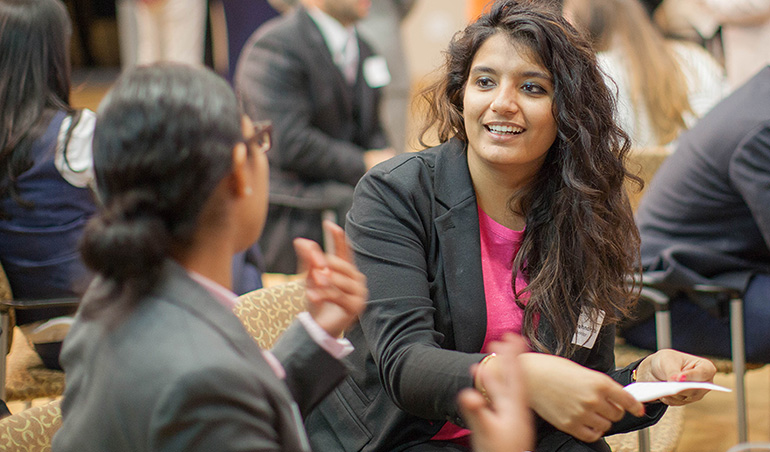
“It was definitely more interesting than networking with recruiters,” said Denis-Diaz. “I learned to keep my comments as positive as possible and to try not to drag out any conversations.”
At the networking event, one exercise was a two-minute introduction-pitch with a potential employer… in this case the person sitting next to them. Another featured one-on-one chats with five individual mentors where students had to ask each one a different question about their career.
Mentor Connie Marianacci, e-commerce strategy and performance manager North and Central America and the Caribbean for AccorHotels, was impressed with the experience some students showed.
“It’s a learning experience and I didn’t expect all of them to be at the same level of training, but you could tell some have had more exposure to networking and were hungry for experience,” said Marianacci. “Others forgot they were there with an objective and started talking about their travels, how pretty their home country is.”
Establishing connections and opening doors.
Typically, the mentors meet with students to share career advice, industry-specific insights and real-world business experience, helping them guide students’ entry into the post-college world. The mentor can also help students be better, more purposeful networkers.
“Students can leverage their mentors to open doors to high-level executives or decision-makers,” Nykolaiszyn insisted. “There’s nothing more important than someone telling a CEO or a CFO ‘this is my mentee, take care of him’. They’re putting their name behind you.”
In 2016-2017 academic year, the College of Business has 208 mentors, including 10 from outside of Florida, up from 117 the previous year. Nearly 300 students applied for the program, which now extends to online students.
At the event Denis-Diaz met individually with several mentors and obtained their business cards, which might be helpful in his quest for an internship and a future career in project management.
Joseph Arbolaez, managing director at Mass Mutual Financial Group, was one of the mentors that Denis-Diaz met.
“After you get your bachelor’s, you should do a certification in project management–that’s good because there’s crossover in the industry,” said Arbolaez. “Then go apply for professional projects.”
What about getting clients, Denis-Diaz asked.
“Networking is still cold-calling,” Arbolaez said. “You keep doing that and do good work, then the referrals start coming in. People will say you’re good at what you do and they’ll endorse you.”



